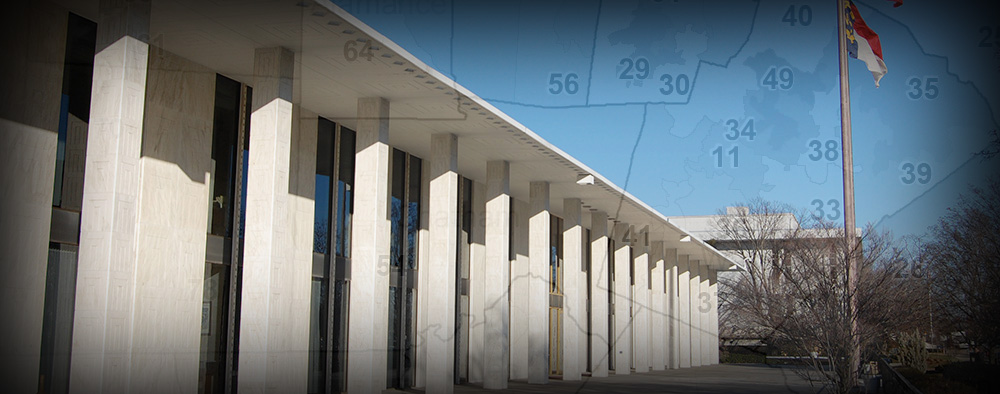Six years ago this week, NC House leaders voted for redistricting reform – now they oppose it. What happened?

It was this week in 2011 when the Republican-led NC House accomplished something never done before in North Carolina: it passed a bill to establish a nonpartisan system for drawing the state’s voting districts.
House Bill 824 passed on June 9, 2011 by a vote of 88-27 with broad bipartisan support. Among the dozens of Republican lawmakers voting in favor of the bill was then-Speaker of the House Thom Tillis, along with Reps. Tim Moore (R-Cleveland) and David Lewis (R-Harnett).
HB824 ultimately stalled in the state Senate that year. But it was nevertheless a milestone for redistricting reform in North Carolina, showing a path to move beyond decades of gerrymandered voting maps.
Six years after the passage of HB824, Tillis continues to voice support for redistricting reform as a member of the US Senate. He told a meeting of the Durham Chamber of Commerce in March that independent redistricting would create less polarizing, more competitive voting maps.
Reps. Moore and Lewis, however, have not been as consistent as Tillis in support of independent redistricting. Today, Moore has succeeded Tillis as speaker of the NC House and Lewis serves as chair of the powerful House Rules Committee. Both Moore and Lewis have apparently reversed course and now oppose efforts to enact the same independent redistricting plan that just a few years ago they voted to support.
“The passage of HB824 by the HC House was an important step forward. It showed that Republicans and Democrats could set aside party politics for the good of the state and support fair redistricting,” said Bob Phillips, executive director of the nonpartisan Common Cause NC. “Many of the same Republicans who supported nonpartisan redistricting in 2011 continue to be consistent in their principled support for fair redistricting today. Sadly, Speaker Moore and Rep. Lewis do not seem to be among them.”
House Bill 200, a plan identical to the one that passed the House in 2011, has been introduced in this year’s legislative session. HB200 has broad, bipartisan support led by four Republican lawmakers: Reps. Jon Hardister (R-Guilford), Jonathan Jordan (R-Ashe, Watauga), Chuck McGrady (R-Henderson) and Sarah Stevens (R-Surry, Wilkes).
The plan would take politics out of the redistricting process. Instead of lawmakers drawing their own districts for partisan advantage, a nonpartisan legislative staff would create congressional and legislative maps completely blind of any political consideration.
But while HB200 has 39 bipartisan co-sponsors in the NC House – far above the typical number of sponsors for a bill in that chamber – and has overwhelming support among North Carolina citizens, the proposal has nonetheless been denied a vote or even a hearing, due largely to opposition from Moore and Lewis.
Instead, since HB200 was introduced nearly 15 weeks ago, it has been left untouched in the House Rules Committee headed by Lewis.
“The dubious claim by Speaker Moore and Rep. Lewis in blocking reform that partisan politics can’t be removed from the redistricting process is just avoiding what they know is the right thing to do,” Phillips said. “North Carolina’s broken redistricting system must be fixed. Clear rules administered by a professional, nonpartisan staff is the cure. Speaker Moore and Rep. Lewis both said as much when they voted for the same reform in 2011. So what happened? What’s different now?”
The anniversary of the passage of HB824 comes during a pivotal week for redistricting reform in North Carolina. On Monday, the US Supreme Court affirmed a lower court ruling that North Carolina lawmakers unconstitutionally gerrymandered 28 of the state’s legislative districts along racial lines, requiring them to be redrawn. It was the third time in two weeks that the high court weighed in against the legislature’s gerrymandering.
Also on Monday, over 150 North Carolina citizens packed a committee room at the legislature for a “People’s Hearing on HB200” to voice support for independent redistricting and to call on legislative leaders to give the bill a formal hearing and vote in the NC House. And on Wednesday, Gov. Roy Cooper announced he would call for a special legislative session to redraw the state’s racially gerrymandered voting maps.
At the same time, there has been a growing groundswell of support for redistricting reform among citizens, the business community and civic leaders.
An April survey from Public Policy Polling found 80 percent of North Carolina voters in favor of independent redistricting. More than 260 locally elected officials from 130 towns and cities across the state have signed a petition urging the legislature to pass nonpartisan redistricting. And over 100 North Carolina business owners have launched a coalition calling for fair voting maps.
“The Republican Party is the original champion of redistricting reform in North Carolina and many of the key supporters of House Bill 200 today are in fact Republicans,” Phillips said. “We would gladly welcome the House leadership, including Speaker Moore and Rep. Lewis, to rejoin the cause they so firmly believed in just a few years ago and give House Bill 200 the vote it deserves.”
See More: Gerrymandering & Representation
